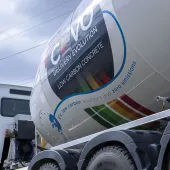Reducing the Carbon Footprint of Asphalt Production
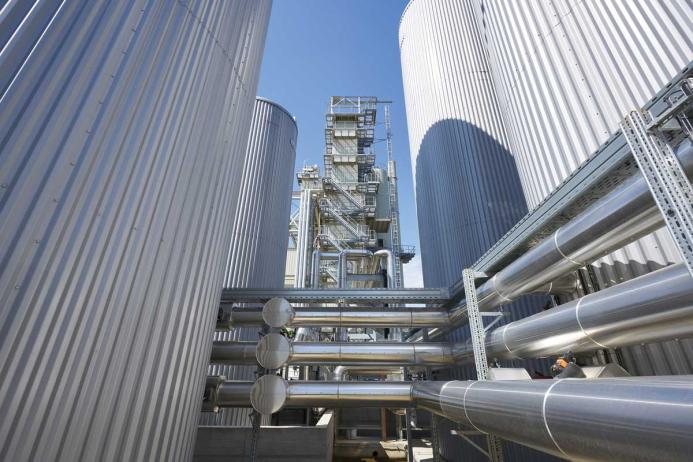
First published in the January 2023 issue of Quarry Management
Working more efficiently with sustainable and economical technologies is the challenge of today and tomorrow for asphalt producers. Benninghoven offer a range of solutions to help reduce emissions and secure the future of asphalt mixing plant sites
Benninghoven offer a variety of innovative solutions for increasing sustainability in asphalt production. Considering the entire road construction process from material acquisition and asphalt production to building the roads, companies can save up to 54% CO2 with these technologies*.
The intelligent Benninghoven solutions include the correct storage of virgin mineral and recycling material, the re-use of asphalt, the use of temperature-reduced asphalt, the electrification of bitumen tanks, and the use of renewable energies.
Sustainable operations and a reduction in climate-damaging emissions are the current challenges for counteracting climate change. The 2015 Paris Climate Accords, for example, require greenhouse emissions to be halved by 2030 and eliminated completely by 2050. Despite being a relatively small sector, the asphalt industry can make an important contribution to this, because asphalt production offers great potential for reducing emissions such as CO2 and Ctot (total carbon).
One of the control instruments for owners of mixing plants is the taxation of emitted CO2 and emissions trading, the costs of which will increase worldwide in the years to come. The fewer greenhouse gases emitted by asphalt mixing plants, the more costs can be saved. Benninghoven support plant owners with a variety of different solutions.
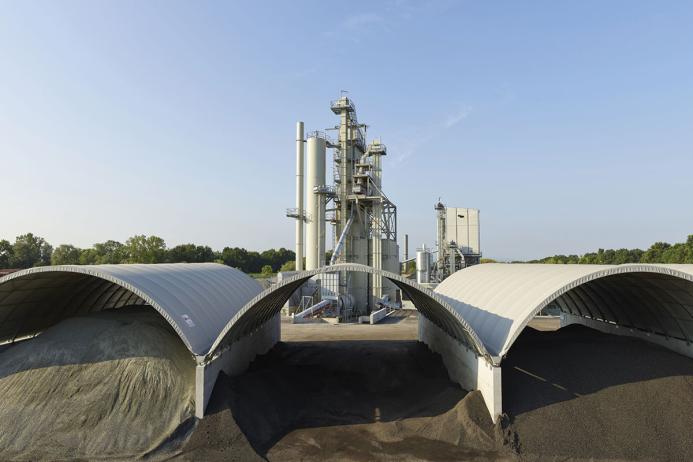
Storing virgin mineral and reclaimed material correctly
Keeping the stored virgin mineral and reclaimed material as dry as possible is an important factor for an energy-efficient mixing process – and therefore for lower emissions such as CO2. With 1% more moisture in the starting material corresponding to one litre of additional heating oil or other energy equivalent for each tonne of asphaltic mixture, this is one of the reasons why the German TA-Luft regulation now requires covered storage of these materials.
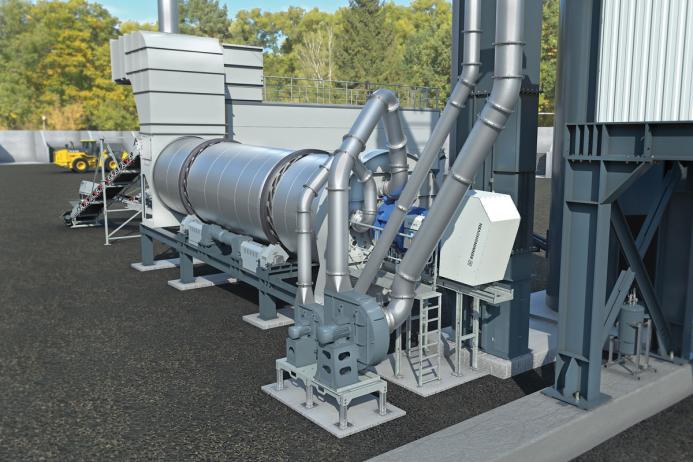
Reusing asphalt
Benninghoven have decades of experience with recycling reclaimed asphalt. But reusing the material is not only sustainable, the material removed by milling existing asphalt during road resurfacing is also significantly cheaper than virgin mineral from a quarry. In addition, reclaimed asphalt already contains bitumen, which is also reused and, therefore, saves on the most expensive ingredient in asphalt production.
Different cold and hot recycling feed systems are offered for this purpose, including the Benninghoven hot-gas generator which allows up to 100% reclaimed material to be added, with low emissions. The Benninghoven REVOC system is a patented innovation that was launched at the bauma 2022 exhibition. This new retrofit solution – a supplement for existing asphalt mixing plants equipped with one or more recycling systems – significantly reduces the total carbon concentrations in the exhaust gas, making it an important contribution to securing the future of asphalt plant sites.
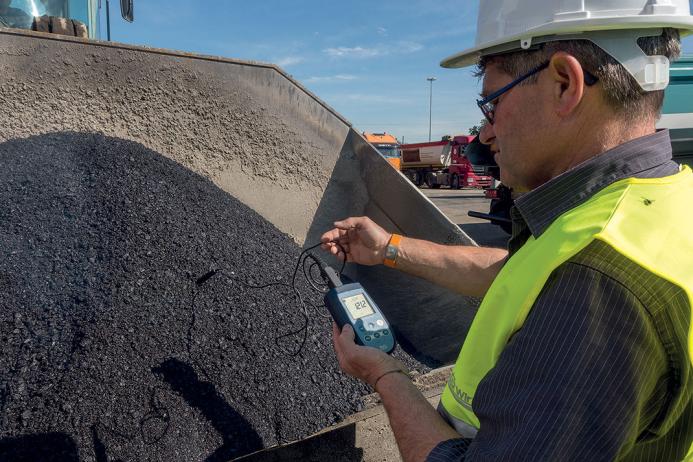
Producing reduced-temperature asphalt
The drying and heating processes for virgin mineral and reclaimed material are particularly energy intensive in asphalt production. Fuel and emissions can be saved if authorities and owners use reduced-temperature asphalt types. This refers to asphaltic mixtures with a final temperature of around 120°C. This equates to a 30% reduction in contrast to conventional mixtures, which usually require a temperature of around 160°C. The savings potential for energy and CO2 is much greater though: 18,000kWh and 6,000kg of CO2 are saved during the production of 2,000 tonnes of asphalt – every day.
Benninghoven asphalt mixing plants are capable of producing high-quality reduced-temperature asphalt in a reliable process. One important technology for this is a foamed bitumen module, which Benninghoven also offers as a ‘plug and work’ retrofit solution. Foamed bitumen is interesting because this binder requires only one auxiliary material for producing reduced-temperature asphalt: water, which is already available at most asphalt mixing plants. Mixing hot bitumen with water multiplies its volume many times, which is why this process is also referred to as ‘foaming’ the bitumen. The released surface energy ensures that the binder moistens the mineral very well during the mixing process, even at low temperatures, temporarily generating installation properties that are comparable to those of hot asphalt.
Electrifying bitumen tanks
For storing the hot bitumen – one of the most important asphalt ingredients – Benninghoven offer bitumen tanks with different capacities. These come with one or multiple chambers and can also be equipped with an agitator or a mixing nozzle. The electrification results in zero local emissions – in contrast to tanks heated with thermal oil. This ensures CO2-neutral bitumen storage in the overall balance. Moreover, electrically heated tanks are not regulated by environmental authorities and there are no environmental restrictions.
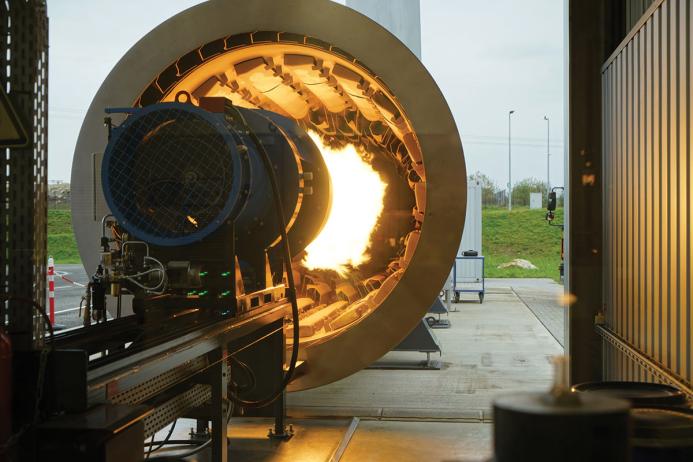
Using renewable energies
More sustainability in asphalt production means moving away from fossil fuels such as coal and oil. Benninghoven already offer EVO JET burners which use the fuels of the future. These fuels are made from renewable raw materials and have a neutral CO2 balance. They include biomass-to-liquid fuels (BtL) and wood dust. Even the complex process of burning wood dust results in a smooth flame pattern – the prerequisite for reliable operation of an asphalt plant.
Benninghoven technology can also be used for modern fossil, gaseous fuels such as liquid gas or natural gas. Changing from coal dust to natural gas or liquid gas already halves CO2 emissions. In addition, Benninghoven development engineers continue to work on the sustainable and economical use of other fuel types. Using hydrogen, for example, could be an option for overcoming the challenges of the future.
* Annual production 100,000 tonnes asphalt, 60% added recycled material, carbon-neutral fuel
- Subscribe to Quarry Management, the monthly journal for the mineral products industry, to read articles before they appear on Agg-Net.com


